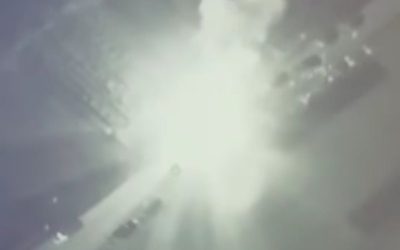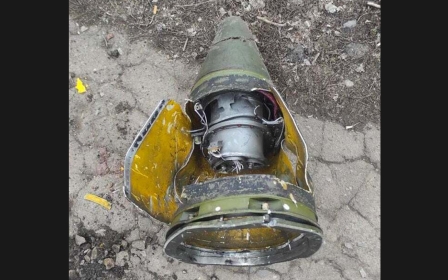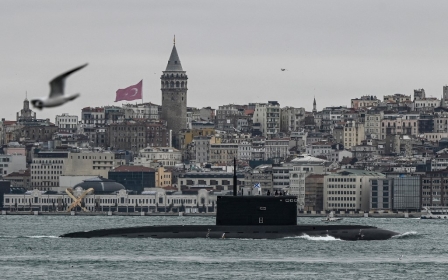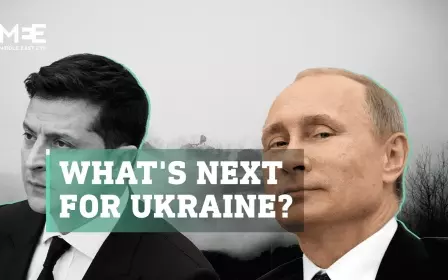Russia-Ukraine war: Turkey's Bayraktar TB2 drones proving effective against Russian forces
Turkey’s Bayraktar TB2 combat drones have become famous in recent years, appearing to play decisive roles in various conflicts. But many experts questioned how effective the Bayraktars would truly be against a serious military power.
Russia's invasion of Ukraine appears to have given them the opportunity to test that theory out.
Footage released by the Ukrainian military over the weekend indicated that TB2s were operating against Moscow's forces, destroying long Russian military columns in Kherson, near Kyiv. Dozens of lives and equipment were reportedly lost in the Bayraktar strikes.
TB2s have a proven track record of success against several adversaries in conflicts in Libya, Syria and Nagorno-Karabakh, yet they have never faced an army with sophisticated electronic warfare capabilities and state-of-the-art air defence systems.
Before Russia attacked, Turkish officials believed the drones could be effective against the Russian military. They pointed to the TB2s' record of destroying various Russian-made weapons in Syria, Nagorno-Karabakh and Libya - in particular, the Pantsir air defence system, which has become a subject of mockery due to its failure to take down the Turkish drones.
Ukraine and Turkey have close defence industry cooperation, a relationship that has flourished in recent years. The TB2's producer Baykar, which has close ties to Turkish President Recep Tayyip Erdogan’s family, was building a plant in Ukraine before the war.
Ukrainian companies also produce the TB2's engines, and Turkey has sold more than 20 Bayraktars to Kyiv over the course of two years. Some experts believe the number of TB2s in the Ukrainian arsenal could be even higher.
Many observers believe that Russia's offensive is not going as planned, and it was foolish of Moscow to send in the troops without first wiping out Ukraine's air force, including its drones.
Yet Russia's failure to take out the TB2s could be down to several reasons. First off, it doesn't have air supremacy over all of Ukraine's airspace.
“Russian Aero-Space Forces have local air superiority over certain theatres, but not true air supremacy over the entire Ukrainian airspace,” Can Kasapoglu, director of defence at Istanbul-based think tank EDAM, told Middle East Eye.
“Besides, the Russian military struck a large number of Ukrainian air bases, but some still have operational runways and facilities. Manned and unmanned operations of Ukraine are attacked, but not totally disrupted."
Robert Lee, a senior fellow at the Foreign Policy Research Institute, says Russia had the capability to destroy TB2s on the ground and at airfields at the beginning of the war, but failed to do so for some reason.
“In addition, it doesn't appear their air defences that escort ground forces into battle were prepared to face the TB2. Not fully clear why that is,” he told MEE.
The footage released by the Ukrainian military indicates TB2s haven't really been threatened by any air defence systems. Evidence so far shows most sorties being carried out easily and without retaliation.
So far there is only open source confirmation of one downed TB2, although the Russian defence ministry claimed that it shot down three of them over the weekend.
Kasapoglu says one of the videos being circulated online shows a TB2 destroying a Buk, a Russian mobile air defence system.
“Lessons learned from Syria, Libya and Karabakh already suggested the combat effectiveness of the Turkish drones against mobile Soviet-Russian air defence weaponry time and again, especially when they lack networked sensor capacity,” he told MEE.
“It remains to be seen, however, whether other successful kills will follow and the Buk strike will turn into a pattern in the course of the war.”
'Lessons learned from Syria, Libya and Karabakh already suggested the combat effectiveness of the Turkish drones against mobile Soviet-Russian air defence weaponry time and again'
- Can Kasapoglu, director of defence at EDAM
Kasapoglu says another incident involving the destruction of a convoy belonging to Russia-allied Chechen fighters near Kyiv was more significant, as these troops are highly experienced units known for their brutality, “which could have tipped the tactical situation there”.
One Turkish source told MEE that the Ukrainians have been using what he calls “hit and run” tactics to overwhelm the Russian troops. The source said TB-2’s low visibility and detectabilty due to their low radar cross section values help them considerably against the Russian defence systems.
“Also open source information suggests the Russians didn’t bring any electronic warfare capabilities with its convoys driving deep into Ukrainian territory," the source said.
Kasapoglu agreed that the Bayraktars appear to be escaping Russian systems.
“It seems that Turkish drones' datalink complexes are staying below the electromagnetic jamming envelopes of principal Russian electronic warfare systems like Krasukha-4, which is optimised to jam onboard systems of manned aircraft,” he said.
“In the Karabakh war, drones were decisive weapons. In Ukraine, they act as tactical force-multipliers and interestingly psychological warfare assets in the digital infosphere."
Others had questioned the effectiveness of Russian electronic warfare systems against the TB2 before the Ukraine war even broke out.
Analysts Stijn Mitzer and Joost Oliemans, who run a popular defence blog called Oryxspioenkop, wrote in December that Russia’s most modern electronic warfare systems failed to combat TB2 in Nagorno-Karabakh. They added that surface-to-air-missile systems such as Pantsir, Tor and Buk, which have been deployed in Syria, Libya and Nagorno-Karabakh, also proved to have little ability against the Turkish drones.
As war raged on Monday, more TB2 footage was leaked on social media, this time showing the drones destroying some Russian trucks - again with relative ease.
“We'll have to wait until the war is over to make any strong conclusions about how effective TB2 were, but it appears they are playing a role right now and I suspect Russia will redouble its efforts to counter them,” the Foreign Policy Research Institute's Lee said.
Levent Kemal contributed to this report.
This article is available in French on Middle East Eye French edition.
Middle East Eye propose une couverture et une analyse indépendantes et incomparables du Moyen-Orient, de l’Afrique du Nord et d’autres régions du monde. Pour en savoir plus sur la reprise de ce contenu et les frais qui s’appliquent, veuillez remplir ce formulaire [en anglais]. Pour en savoir plus sur MEE, cliquez ici [en anglais].





